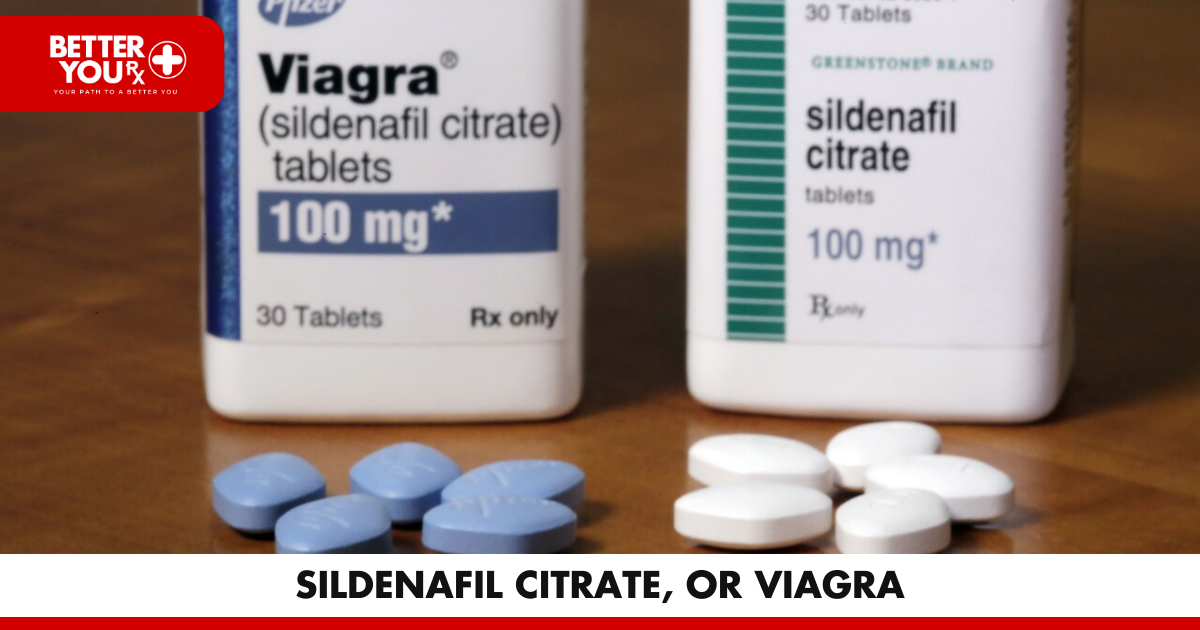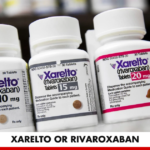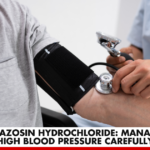Erectile dysfunction (ED) is treated with the oral medication sildenafil (Viagra). You only take it as necessary, usually an hour or so before engaging in sexual activity, however, you can take it anywhere from 30 minutes to 4 hours beforehand. Sildenafil (Viagra) should not be taken more than once per day as doing so increases your risk of experiencing dangerous side effects like eyesight loss or low blood pressure. It is offered as a less expensive generic.
How Viagra (Sildenafil) functions
PDE-5 is inhibited by the drug sildenafil, which is found in Viagra. Your body contains a protein called PDE-5 that disintegrates the chemicals that often induce an erection. Sildenafil (Viagra) helps an erection happen by enabling some penis muscles to relax and the penis to fill with blood when it blocks PDE-5.
What is the purpose of sildenafil (Viagra)?
Erectile dysfunction (ED)
Doses of sildenafil (Viagra)
- 25mg
- 50mg
- 100mg
Sildenafil dosage guidelines (Viagra)
The usual dosage is to take 50 mg of sildenafil (Viagra) orally as needed, roughly an hour prior to having intercourse. The highest dose that is advised is 100 mg. Never take sildenafil (Viagra) in excess of once daily.
What negative consequences might sildenafil, or Viagra, cause?
Significant Side Effects
Immediately get in touch with your doctor if you encounter any of the following.
- An erection that lasts longer than four hours
- Loss of vision
- Symptoms of dangerously low blood pressure include feeling weak or faint, dizziness, fuzzy vision, and confusion.
As your body becomes accustomed to the drug, the following adverse effects could improve with time. If you continue to experience these symptoms or if they get worse over time, call your doctor right once.
Typical Adverse Effects
- Migraine (16–28%)
- Flushing (ten to 19%)
- Diarrhea (3-17%)
- Vision or light sensitivity changes (1–11%)
- Congested nose (4–9%)
Additional Effects
- Backache
- Unsteadiness
- Muscle pain
- Vomiting
- Rash
Pros and cons of Sildenafil (Viagra)
Pros
- One of the first-choice medications for treating ED
- Taken only when you need it
- Can take it 30 minutes to 4 hours before sexual activity
- Available as a lower-cost generic
- Comes in different strengths, so you and your provider can find which works best for you
Cons
- May require some time to complete, therefore preparation is required.
- Unable to be taken if a heart attack or stroke occurred during the previous six months.
- Not to be used if nitrates such as isosorbide dinitrate (Isordil) or nitroglycerin (Nitrostat) have recently been consumed.
- People over 65 are more susceptible to adverse symptoms such as headaches and flushing
Sildenafil (Viagra) pharmacy advice
- It is recommended to take sildenafil (Viagra) approximately an hour before having intercourse, though you can take it up to 4 hours beforehand.
- Sildenafil (Viagra) can be taken with or without food, however, it works best when taken right after eating.
- Limit your daily sildenafil (Viagra) dosage to one dose. By doing this, you run a higher risk of experiencing negative side effects like eyesight loss and dangerously low blood pressure.
- If you have pain while having an erection or if it lasts more than four hours, visit the emergency room or contact your provider straight once. This can harm your penis permanently if left untreated.
- Let your doctor know you take sildenafil (Viagra) if they prescribe you any blood pressure or cardiac drugs. The combination of sildenafil (Viagra) and some drugs, such as isosorbide mononitrate (Monoket), might result in a dangerously low blood pressure reading.
- Sexually transmitted infections (STDs) including HIV and herpes cannot be prevented by sildenafil, the active ingredient in Viagra. Use a condom made of latex or polyurethane to engage in safe sex.
What dangers and recommendations come with sildenafil (Viagra)?
Serious health problems may result from taking sildenafil (Viagra). Some groups may be an even greater danger than others. Consult your doctor or pharmacist about alternate possibilities if this worries you.
Heart issues
- Heart disease already present; recent heart attack or stroke within the last six months; high or low blood pressure
If you have any heart issues, tell your doctor before taking sildenafil (Viagra). Sildenafil (Viagra) and sexual activity are not advised for those with certain cardiac diseases, such as very severe heart failure. Additionally, studies on sildenafil (Viagra) in patients with specific disorders, such as recent heart attacks or strokes, have not been conducted. Consult your doctor to find out if sildenafil (Viagra) is safe for you if you have a heart issue.
Reduced blood pressure
- Risk factors include using alpha-blockers, taking blood pressure or angina drugs, and taking ritonavir (Norvir).
Your blood pressure may fall too low if you use sildenafil (Viagra) along with certain drugs, such as alpha-blockers, drugs for high blood pressure, or ritonavir (Norvir). Consult your doctor if you use any of these drugs to determine whether sildenafil (Viagra) is safe for you. If your doctor approves of your use of sildenafil (Viagra), they might advise that you monitor your blood pressure frequently. When rising from a seated or lying-down posture, proceed with extreme caution as doing so can make you feel faint and increase your risk of falling. Sildenafil (Viagra) should never be taken along with nitrate medications for angina since it can cause your blood pressure to drop abruptly to hazardous levels.
An extended or uncomfortable erection (priapism)
- Penis-related illnesses, leukemia, multiple myeloma, and sickle cell anemia are among the risk factors.
When using sildenafil (Viagra), some persons experienced priapism or an erection that lasted longer than four hours. This negative consequence is uncommon. However, it can result in irreversible harm to your penis if it is not treated in a timely manner. If you have sickle cell anemia, multiple myeloma, leukemia, or other illnesses that affect your penis, you run a higher risk of experiencing these side effects. If you experience pain while having an erection or if it lasts more than four hours, get medical attention immediately once.
Vision alters
- Age 50 or older, “clogged” optic disc, and eye blood vessel issues are risk factors.
Go to the emergency room or contact your provider straight away if you detect unexpected changes in your vision in one or both of your eyes. Despite its rarity, sildenafil (Viagra) can permanently harm the eyes. You may be more susceptible to vision alterations with sildenafil (Viagra) if your doctor has advised you that you have a “crowded” optic disc. Before using sildenafil (Viagra), be sure to fully disclose your medical history to your doctor.
Loss of hearing
Sildenafil, the active ingredient in Viagra, has been linked to hearing loss in certain users. Additionally, it can occasionally be accompanied by vertigo and ringing in the ears (tinnitus). If you detect alterations in your hearing in one or both ears, visit the emergency hospital straight soon or give your physician a call.
Medications that interact with each other
- Age 65 or older, liver and kidney issues, blood pressure drugs, use of alpha-blockers, and use of specific antifungal or antiviral medications are risk factors.
Certain medicines and sildenafil (Viagra) may interact negatively. Before beginning to use sildenafil (Viagra), it’s crucial that you inform your doctor about all the medications you’re currently taking. For instance, sildenafil (Viagra) and nitrate drugs shouldn’t be taken together since they can induce dangerously low blood pressure. Your doctor might wait to suggest sildenafil (Viagra) if you are taking other blood pressure medications until your blood pressure is under control. You run an increased chance of experiencing adverse effects like headaches, flushing, and changes in vision if you combine sildenafil (Viagra) with drugs like oral azole antifungals and ritonavir (Norvir).
For effective utilization, abide by pharmacist recommendations. Take Viagra an hour before intimacy, and for optimal results, consume it on an empty stomach. Adhering to daily dosage limits is crucial to minimize potential severe side effects. Timely action is paramount if facing erection discomfort lasting more than four hours.
Communicate openly with your healthcare provider about any concurrent blood pressure or heart medications, as certain interactions may pose risks. Remember, Viagra doesn’t prevent STDs; practice safe sex with latex or polyurethane condoms.
In conclusion, Viagra’s potential to invigorate intimacy is undeniable. However, it’s imperative to be well-informed and consult professionals to navigate its usage safely. Explore this transformative option for ED at Better You Rx pharmacy, where your well-being and satisfaction are paramount.



